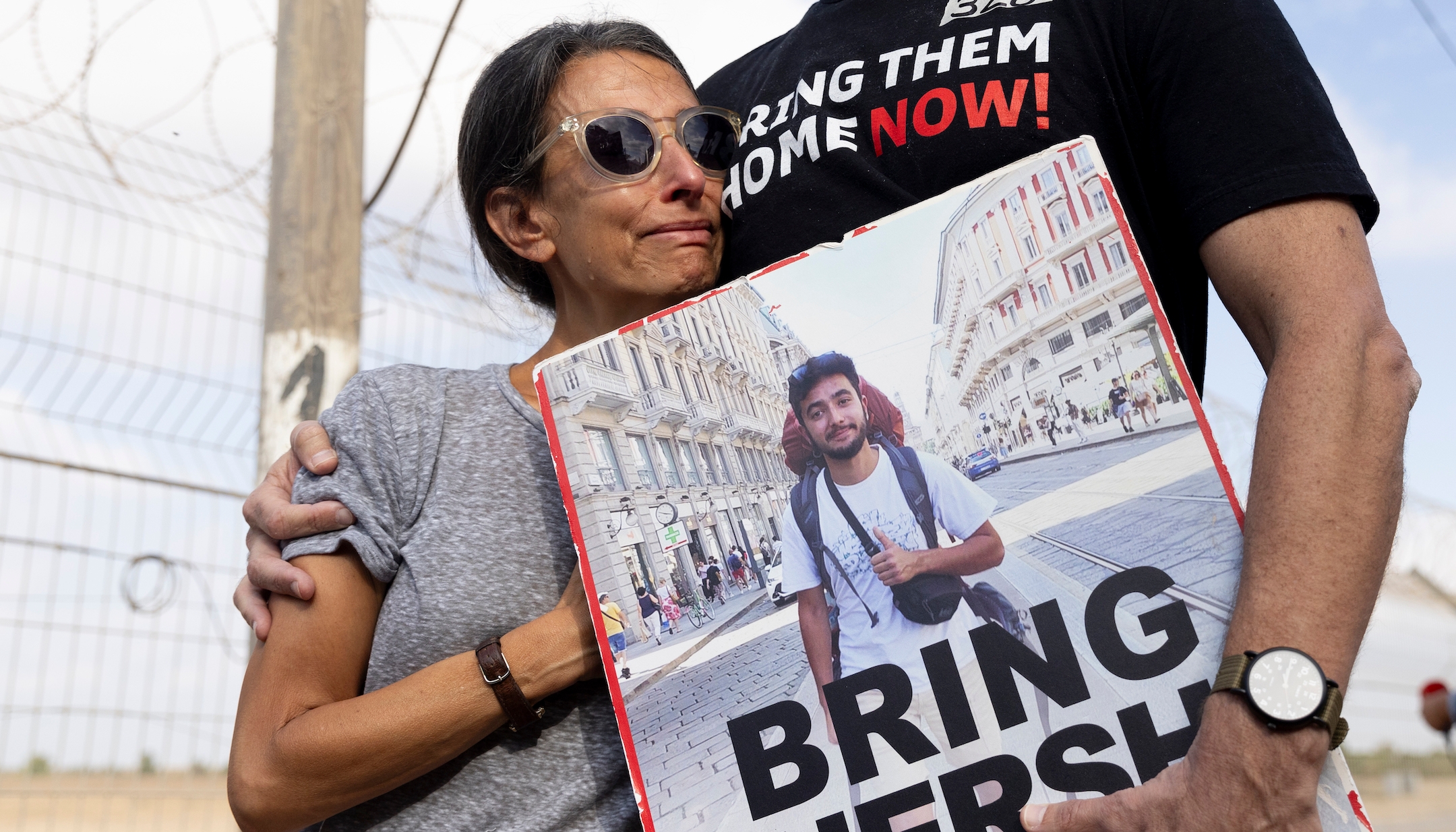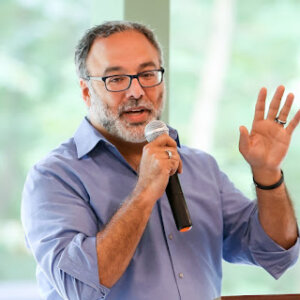Rachel is weeping for her child: In a grieving Jewish mother, we see our Jewish matriarch
Today’s parallels with ancient Jewish trauma are overwhelming — and even the Bible falls short, a rabbi writes

Rachel Goldberg, the mother of hostage Hersh Goldberg-Polin who was kidnapped by Hamas on Oct. 7, stands with her husband as hostage families address Gaza via loudspeaker from Nirim, Israel, Aug. 29, 2024 (Amir Levy/Getty Images)
(JTA) — The ancient words of the prophet Jeremiah haunt my soul today:
A cry is heard in Ramah—
Wailing, bitter weeping—
Rachel weeping for her children.
She refuses to be comforted
For her children, who are gone.
This biblical verse resonates with Rachel the matriarch’s timeless grief as she weeps for her children, for the pain of exile and the fear of annihilation, refusing comfort until her precious ones are back in her arms. And while her fierce tears are the tears of every parent whose child is lost to the cruelty of the world, their heightened, tragic resonance today is tribal and visceral for Jews all around the world, united in anguish as Rachel weeps once more, as our hearts are shattered yet again.
Another Rachel has more recently gripped us with the grief of a bereft Jewish mother. Rachel Goldberg-Polin and her husband Jonathan Polin have demonstrated the epitome of both parental love and parental pain in truly biblical proportions for their beloved son, Hersh, who was taken hostage on Oct. 7 from the Nova Music Festival in Southern Israel. They were indefatigable and omnipresent for 330 days, speaking and shouting and crying and praying on every platform in every corner of the world, most recently inspiring chants of “Bring Them Home Now” from tens of thousands at the Democratic National Convention in Chicago just two weeks ago.
Just days ago, Rachel and Jonathan, along with many family members of hostages still trapped by Hamas, traveled to the border of Gaza to call out to their loved ones through giant speakers, crying from the deepest part of them to the deepest recesses of Hamas’ labyrinth of underground tunnels. Rachel cried out, “It’s Mama,” praying her son would hear her voice again, sending Hersh other biblical words, the priestly blessing of protection and peace.
But just yesterday, we learned that Hersh had been murdered by his terrorist captors at perhaps the very same moment. It is too much to bear. In the ancient world, there was a practice called yelala, a wailing for the dead. Paid mourners would go to funerals to evoke the tears of the bereaved, to break through the composed and collected facades people often maintained in public. When I heard Rachel scream Hersh’s name, something in me broke again.
Today’s parallels with ancient Jewish trauma are overwhelming. In the face of this new and even more horrifying reality, with 97 hostages still trapped in Gaza, many of whom are already dead, even the Bible falls short. The very next verse in Jeremiah reads:
Thus said God:
Restrain your voice from weeping,
Your eyes from shedding tears;
For there is a reward for your efforts — declares God:
They shall return from the enemy’s land.
But the violation of Israel’s borders and of Jewish dignity, the inhumanity of Hamas’ murderous rampage, the sexual violence against women and men, the slaughtering of whole families, the stealing of grandparents and babies from their homes, and now the brutal execution of defenseless hostages all mean that any prophesied return or reward for the unceasing efforts of the Hostages and Missing Families Forum and its many allies will forever be partial.
Hersh Goldberg-Polin, Eden Yerushalmi, Carmel Gat, Almog Sarusi, Alex Lubanov, and Ori Danino were discovered murdered on Saturday. They will not return home alive.
Why does Hersh’s death hit so hard, for many of us as intensely as the horror of Oct. 7 itself? Because the pain has come true once again and the hope has not. Because Rachel and Jonathan did the impossible for their son and it didn’t save him. They met with the pope and the president, heads of state around the world and youth groups traveling to Israel over the summer. They inspired countless others to take on a daily ritual, of wearing a piece of masking tape tattooed with the day’s horrid number since Oct. 7.
Why do we feel this loss so very deeply? Because Jonathan and Rachel — and Hersh and Eden and Carmel and Almog and Alex and Ori are me. They’re you. They’re your children. Taken from our arms, from their cribs, from their kibbutzim, from their homes. Are these the only tears that have been shed? No. But they are our tears, and they have flowed with no end these last 331 days.
Echoes of Rachel’s cry — both Rachel Imeinu’s and Rachel Goldberg-Polin’s — reverberate through the streets of Israel, and in Jewish communities spanning the globe. And our shattered hearts and hot tears will not be restrained, not by biblical command, not by empty rhetoric, not even by crowds of grieving, compassionate others. These ancient/modern tears command us to stand with Rachel, to refuse to be comforted by platitudes and empty promises, to demand justice, to work tirelessly to bring the rest of the Hostages home, and to settle for nothing less than a world where no mother has to cry out for her child.
All of this leads to heart-rending silence and soul-splitting cries. My own rambling words spilled out:
i dreamt I was dreaming
that a crying sky was imagined
that rachel’s cry could still be heard
that comfort would still be possible.
i woke
to my People’s shattered heart
and photos of six precious Jewish children
whose cries are no longer heard.
may their souls finally be at rest.
i walk through a haze
my mind races
my heart cries
rachel, rachel, crying for her child.
i cry with you.
As long as any Rachel weeps, our work is not done. We must continue to be her voice, her hands, her hope, building a future where the promise of return and safety is fulfilled for those still in darkness.
May the memory of Hersh, and all those lost on and since Oct. 7, 2023, be a blessing. May their names be inscribed in the book of life, and may we be worthy of the task of bringing the rest of Rachel’s children home.
The views and opinions expressed in this article are those of the author and do not necessarily reflect the views of JTA or its parent company, 70 Faces Media.

















